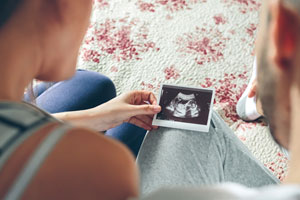
Losing Ramona – Pregnancy and Loss
Michele’s Story
On December 23, 2013, my husband Kyle and I drove to the hospital at 11 p.m., giddy with the expectation that shortly we'd be holding our newborn baby girl, Ramona, in our arms. I was 40 weeks and 3 days pregnant, three days away from a scheduled induction if baby didn't come before then. Luckily for me, I thought, labor started the day before Christmas Eve. Earlier that same day my best friend, Jessica, had delivered her own baby girl by emergency C-section at 32 weeks pregnant. I spent the afternoon visiting Jessica, her husband Lloyd, and baby Savannah in the hospital, anticipating a return to the hospital later that evening to deliver my own little girl.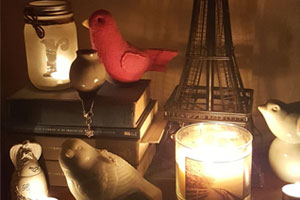
When we arrived at the hospital, I was wheeled to triage and went through the check-in process. I settled into the hospital bed while the nurse tried to position the fetal heart rate monitor, and I watched her smile tighten as she moved it around. I heard a nurse in the hallway tell someone, “Get her doctor, now.” Even then, I had very little idea how our lives were about to be turned upside down. After searching for a heartbeat, our OB reached across my lap, grabbed my hands and said, "I'm so sorry." Our baby had died, and now I would have to deliver her, stillborn.
Three days later I received the news Jessica and Lloyd's baby girl, Savannah, had also died. Ramona and Savannah shared the same death date: December 24, 2013.
The days, weeks, and months that followed were the most difficult we have ever known. The intense physical pain, indescribable grief, and what I would later learn was trauma, consumed us. In the locked nursery across the hall, I was equipped with every tool to take care of my newborn baby. I had painstakingly picked out the best swaddles, stroller, car seats, and video monitor. On the car ride home on Christmas morning, as Silent Night played over the radio, I realized I had nothing to help me get through the days to come. No one had given me an “In Case Your Baby Dies” handbook. I felt helpless, hopeless and utterly unprepared.
Fortunately, I connected with many loss parents, joined a support group, found a therapist, and over time have been able to return the support I was given to newly bereaved parents. Looking back, these are the things I wish I’d known when Ramona died.
 You did the best you could at the time
You did the best you could at the time
My OB and nurses were very supportive, but not very hands-on once I had delivered Ramona. To this day I have regrets about how much time we spent with her in the hospital, not taking our own photos, and not dressing her in the clothes we had brought. I remind myself that I did the best I could at the time. I had expected an entirely different outcome and had no idea what I could or should do in our situation. No one hands you a handbook after your baby’s death. After years of therapy and support group meetings, I am convinced Ramona knew nothing but love while she was alive, and I did the best I could for her in death.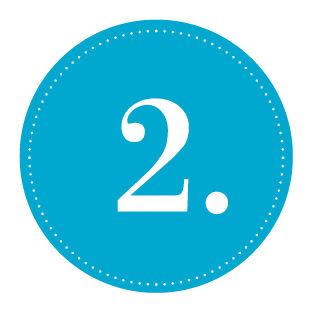 Your partner might grieve differently
Your partner might grieve differently
Communication with your partner will help, but it's important to remember that even if they don't show it, they are still grieving. My husband Kyle felt like he needed to be strong for me, so he kept a lot of emotion inside. He also had the responsibility of telling our family and friends Ramona had died, and that took a huge emotional toll. While I needed to discuss my feelings all day, every day, he needed quiet introspection. Five years later, I still attend our grief support group every month and he doesn’t. As long as he feels safe and supported in his grief, it’s ok that our grieving processes are different.There is no timeline for grief
There is a common misconception that once a person “gets through” the stages of grief, they will be fine. Grief is not a linear timeline, nor are the stages of grief meant to be experienced and never revisited. I had many people tell me when I was angry that they didn’t want me to get ”stuck” in the anger phase, like the sooner I got out of it, I could move on to the other stages and get back to my old self. After four years of therapy, I have developed skills that help me cope with my anger and uncover the emotions masked by anger, but I will never be my ”old self.“ Losing a baby changes you, sometimes in small ways, sometimes in profoundly life-changing ways. Grief never goes away, but it ebbs and flows and becomes manageable over time. Trauma and grief are different. Both need care and attention.
Recognizing the trauma of pregnancy and infant loss and treating trauma is so important. Ten months after Ramona died, I was not doing well. I was crying for literally hours a day, experiencing severe anger issues and constantly reliving the days of her death and birth. Once the shock of her death had worn off, I was left with overwhelming emotions that made it difficult to function in everyday life. I realized I needed help that no one else was equipped to give me.
I found the number to a counseling center near my house and made the call. I met my therapist a few days later and the relief I felt was immediate. I wish I'd tried therapy sooner. Therapy isn't about being 'fixed,' it’s about learning tools to help you through the hard moments in life. I learned so many coping skills with therapy that help me to this day, and not just with my loss.
I like having an objective person to pour my heart out to who doesn't judge me, and who validates my feelings. I was lucky and clicked with my therapist on our first visit, but don't be afraid to try someone different if you aren’t comfortable. My therapist reassured me if after a few visits I didn’t feel comfortable with her, the office would find someone else for me and she wouldn’t be upset. She still asks me if I’m comfortable from time to time, and it’s been four years.
![]()
Mental health coverage is offered by all HAP plans. We can help you find a behavioral health specialist to talk to about treatment. Call (800) 444-5755 to speak with a HAP managed care specialist.
![]()
It's OK to step away from family and friends
I found it difficult to be around babies, small children and pregnant women in the years following my daughter's death. When I pushed myself to “be ok,” I would inevitably end up triggered and back to square one. This was especially true around all the babies born in the short time after Ramona and Savannah. Baby showers, children’s birthday parties and gender reveals were completely off the table.Some people understood and supported me no matter what. Some people did not. I read a quote in the early days of my grief, “Hard times will always reveal true friends.” I have found that to be very true. Protecting my heart was a risk I was willing to take, but it still hurt when people I was previously close to didn’t understand why I needed space. Thankfully there were many family and friends who gave us unconditional support.
Once I was able to put into words why I needed to keep my distance, it made it easier to turn down invitations to baby showers, birthdays, and other events I knew I wouldn’t feel comfortable attending. Over time, I have been able to attend a couple of baby showers and seeing a child Ramona’s age doesn’t affect me like it used to, but I still set limits for my own peace of mind.
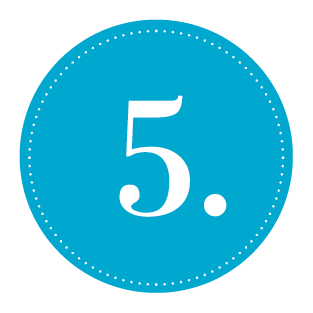 Support groups are important even if you think you have good support.
Support groups are important even if you think you have good support.
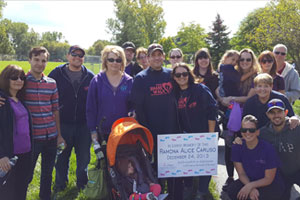
My best friend Jessica and I attended our first support meeting with Metro Detroit Share two months after our daughters died and it was so helpful. Metro Detroit Share is the local chapter of National Share, a support network whose mission is “to serve those whose lives are touched by the tragic death of a baby through pregnancy loss, stillbirth, or in the first few months of life.”
Angie Winton founded the Metro Detroit chapter of Share after feeling like there was nowhere to turn when her daughter Brooke Marie was stillborn in 2005.
“I desperately wanted to talk to someone, anyone, who could tell me things like ‘I won't feel like this forever, that there is hope after loss,’ and to validate any 'crazy' feelings I had,” Winton said.
Being around other men and women who had experienced similar losses helped us get through the first year and beyond. Sharing our daily struggles, fears and grief with people who truly understood and provided validation is priceless.
Winton believes connecting with others who have experienced a similar loss creates an invaluable network for parents and other family members.
“I believe the support group also gives you that extra 'family' that remembers your child with you and understands that you will never 'get over this,’” Winton said.
In addition to monthly support meetings, Winton also founded the Walk for Remembrance and Hope, an annual event that honors the lives of babies gone too soon.
The 10th Annual Walk for Remembrance and Hope will be held Sunday, October 7, 2018 at Heritage Park Sheridan Pavilion 12111 Pardee Road, Taylor, Michigan at 12 p.m. Contact Angie Winton at (313) 492-1172 for more information. Monthly support meetings are held the third Wednesday of each month at VFW Post 44227 11590 Pine Street, Taylor, Michigan at 7 p.m.
Contact Michele Caruso at (313) 850-5523 for more information on meetings and the walk is also available on the Metro Detroit Share website.
Every loss is different, and my hope is every person experiencing miscarriage, stillbirth, or infant loss gets the support they deserve.
Read more maternity stories:
Your Pregnancy Resource Center: Essential Articles for Parents-to-Be
Being pregnant can be overwhelming, but we’re here to help.
Categories: Get Healthy
Tags: Blog
